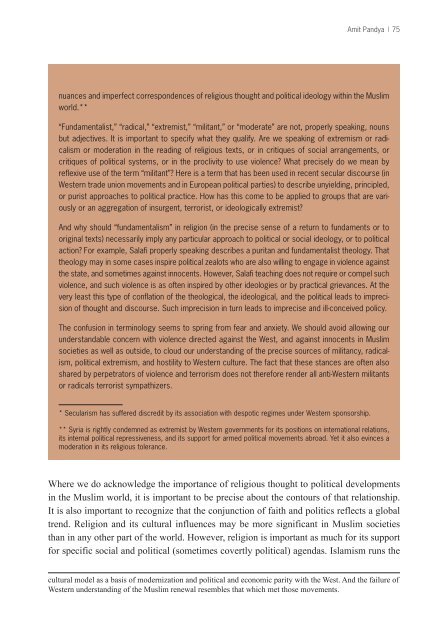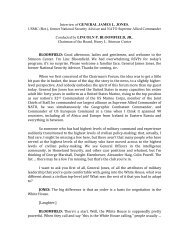Islam and Politics - The Stimson Center
Islam and Politics - The Stimson Center
Islam and Politics - The Stimson Center
Create successful ePaper yourself
Turn your PDF publications into a flip-book with our unique Google optimized e-Paper software.
Amit P<strong>and</strong>ya | 75<br />
nuances <strong>and</strong> imperfect correspondences of religious thought <strong>and</strong> political ideology within the Muslim<br />
world.**<br />
“Fundamentalist,” “radical,” “extremist,” “militant,” or “moderate” are not, properly speaking, nouns<br />
but adjectives. It is important to specify what they qualify. Are we speaking of extremism or radicalism<br />
or moderation in the reading of religious texts, or in critiques of social arrangements, or<br />
critiques of political systems, or in the proclivity to use violence? What precisely do we mean by<br />
reflexive use of the term “militant”? Here is a term that has been used in recent secular discourse (in<br />
Western trade union movements <strong>and</strong> in European political parties) to describe unyielding, principled,<br />
or purist approaches to political practice. How has this come to be applied to groups that are variously<br />
or an aggregation of insurgent, terrorist, or ideologically extremist?<br />
And why should “fundamentalism” in religion (in the precise sense of a return to fundaments or to<br />
original texts) necessarily imply any particular approach to political or social ideology, or to political<br />
action? For example, Salafi properly speaking describes a puritan <strong>and</strong> fundamentalist theology. That<br />
theology may in some cases inspire political zealots who are also willing to engage in violence against<br />
the state, <strong>and</strong> sometimes against innocents. However, Salafi teaching does not require or compel such<br />
violence, <strong>and</strong> such violence is as often inspired by other ideologies or by practical grievances. At the<br />
very least this type of conflation of the theological, the ideological, <strong>and</strong> the political leads to imprecision<br />
of thought <strong>and</strong> discourse. Such imprecision in turn leads to imprecise <strong>and</strong> ill-conceived policy.<br />
<strong>The</strong> confusion in terminology seems to spring from fear <strong>and</strong> anxiety. We should avoid allowing our<br />
underst<strong>and</strong>able concern with violence directed against the West, <strong>and</strong> against innocents in Muslim<br />
societies as well as outside, to cloud our underst<strong>and</strong>ing of the precise sources of militancy, radicalism,<br />
political extremism, <strong>and</strong> hostility to Western culture. <strong>The</strong> fact that these stances are often also<br />
shared by perpetrators of violence <strong>and</strong> terrorism does not therefore render all anti-Western militants<br />
or radicals terrorist sympathizers.<br />
* Secularism has suffered discredit by its association with despotic regimes under Western sponsorship.<br />
** Syria is rightly condemned as extremist by Western governments for its positions on international relations,<br />
its internal political repressiveness, <strong>and</strong> its support for armed political movements abroad. Yet it also evinces a<br />
moderation in its religious tolerance.<br />
Where we do acknowledge the importance of religious thought to political developments<br />
in the Muslim world, it is important to be precise about the contours of that relationship.<br />
It is also important to recognize that the conjunction of faith <strong>and</strong> politics reflects a global<br />
trend. Religion <strong>and</strong> its cultural influences may be more significant in Muslim societies<br />
than in any other part of the world. However, religion is important as much for its support<br />
for specific social <strong>and</strong> political (sometimes covertly political) agendas. <strong>Islam</strong>ism runs the<br />
cultural model as a basis of modernization <strong>and</strong> political <strong>and</strong> economic parity with the West. And the failure of<br />
Western underst<strong>and</strong>ing of the Muslim renewal resembles that which met those movements.

















